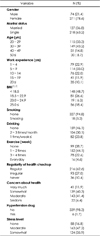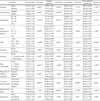Abstract
Purpose
The purpose of the study was to identify teacher's knowledge about sodium, dietary behaviors related to sodium, attitudes towards a low-salt diet, and meal attitude guidance as well as examine the relationship between these variables.
Methods
The participants were 351 teachers at an elementary school in the Jeonbuk area. The data were analyzed using ANOVA, Duncan test, and Pearson correlation coefficients with SPSS v. 20.0.
Results
The score for teachers' knowledge about sodium was 12.92 points of a possible 16, the score for dietary behavior related to sodium was 46.85 points of a possible 70, and the score for attitude towards a low-salt diet was 33.63 points of a possible 50. Their score for meal attitude guidance was 59.95 points of a possible 80. The knowledge showed significant differences by hypertension drug (p < 0.05) and stress level (p < 0.05). The dietary behavior of sodium use showed significant differences by gender (p < 0.01), work experience (p < 0.05), BMI (p < 0.01), drinking (p < 0.05), concern about health (p < 0.05), and stress level (p < 0.05). The attitude towards a low-salt diet showed significant differences by gender (p < 0.05), marital status (p < 0.05), work experience (p < 0.05), drinking (p < 0.05), concern about health (p < 0.001), and stress level (p < 0.05). Meal attitude guidance showed a significant difference by marital status (p < 0.001), age (p < 0.001), work experience (p < 0.001), drinking (p < 0.01), regularity of health checkup (p < 0.001), concern about health (p < 0.001), and stress level (p < 0.05). There was a low positive correlation between knowledge about sodium and dietary behavior related to sodium as well as between dietary behavior related to sodium and attitudes towards a low-salt diet. Attitudes towards a low-salt diet showed a positive correlation with meal attitude guidance.
Figures and Tables
References
1. The Korean Nutrition Society. Dietary referece intakes for Koreans. 1st rev. Seoul: The Korean Nutrition Society;2010.
2. Knorpp L, Kroke A. Salt reduction as population-based preventive measure. Part 1: need for action in Germany. Ernährungs-Umschau. 2010; 57(6):294–300.
3. Lee SY, Shin MH, Sung MK, Paik HY, Park YK, Kim J, Sohn JW, Kim WG, Jung HJ, Ahn YO. Establishment of Korean dietary guidelines for cancer prevention. Korean J Health Promot. 2011; 11(3):129–143.
4. Jeong YS, Lim HJ, Kim SB, Kim HJ, Son SM. Blood pressure and dietary related risk factors associated with high sodium intake assessed with 24-hour urine analysis for Korean adults. Korean J Community Nutr. 2014; 19(6):537–549.

5. Ministry of Health and Welfare, Korea Centers for Disease Control and Prevention. Korea Health Statistics 2014: Korea National Health and Nutrition Examination Survey (KNHANES VI-2). Cheongju: Korea Centers for Disease Control and Prevention;2015.
6. Ministry of Health and Welfare, Korea Centers for Disease Control and Prevention. Korea Health Statistics 2010: Korea National Health and Nutrition Examination Survey (KNHANES V-1). Cheongwon: Korea Centers for Disease Control and Prevention;2011.
7. Park YS, Son SM, Lim WJ, Kim SB, Chung YS. Comparison of dietary behaviors related to sodium intake by gender and age. Korean J Community Nutr. 2008; 13(1):1–12.
8. Kang MH, Yoon KS. Elementary school students' amounts of sugar, sodium, and fats exposure through intake of processed food. J Korean Soc Food Sci Nutr. 2009; 38(1):52–61.

9. Lim HJ. A study on the calcium and sodium intakes and urinary calcium excretion of preschool children in Busan. Korean J Nutr. 2001; 34(7):786–796.
10. Lee SS. The effect of taste preference on anthropometric measurements and nutrient intakes in children. Korean J Community Nutr. 2001; 6(2):130–138.
11. Rho JO, Lee SI, Lee JS. A study on the dietary behaviors of daycare center teachers and their meal attitude education during meal time in Jeonju area of Korea. Korean J Food Nutr. 2010; 23(3):342–351.
12. Yim J, Cho M, Yin C, Seo BK, Koh HG, Choue R. Nutrients and salt consumption of hypertension patients according to treatment status. Korean J Nutr. 2005; 38(9):706–716.
13. Lim SY. The study of elementary school teachers' awareness and knowledge of food additives and the actual condition in dietary education [dissertation]. lncheon: Gyeongin National University of Education;2010.
14. Kim MS, Kim HJ, Lee YE, Lee YE. Operation and perception on dietary life education and nutrition counseling of elementary school in Chungbuk province. J Korean Soc Food Sci Nutr. 2013; 42(12):2049–2067.

15. Jung IK. A study on perception of teachers on the nutrition education in elementary school curriculum. J Korean Home Econ Educ Assoc. 2005; 17(4):73–85.
16. Jung KA. A study on the dietary habits of 5th & 6th grade students and the dietary life education by teachers: focused on the elementary schools in Chuncheon area. Korean J Culinary Res. 2012; 18(3):266–285.
17. Sherry JS. An evaluation of elementary school nutrition practices and policies in a southern Illinois county. J Sch Nurs. 2008; 24(4):222–228.

18. Yun IS, Jung SJ, Pack JE, Cha YS. A study on food habit and nutrition knowledge of elementary school teachers in Jeonbuk area. Korean J Hum Ecol. 2007; 10(1):71–80.
19. Seo GS. A study on eating habits and nutritional knowledge of secondary school teachers in Jeonbuk province [dissertation]. Jeonju: Chonbuk National University;2006.
20. Lee KA. Pre-service elementary school teachers' eating habits, and their perceptions of eating traditional Korean foods, based on the health belief model. J Korean Pract Arts Educ. 2014; 27(1):45–65.
21. Hwang HH. Analysis of knowledge of dietary sodium, eating attitudes and eating behaviors and a salty taste assessment among elementary, middle, and high school students in Daegu [dissertation]. Daegu: Kyungpook National University;2012.
22. Lee DH, Kim SY, Bae IO, Lee HG. Dietary behaviors related to sodium intake of the middle school students in Seoul. J Korean Living Sci Res. 2010; 30(2):16–22.
23. Shim E, Yang YJ, Yang YK. Relationship between thresholds and self-assessed preference for saltiness and sodium intake in young women. J Nutr Health. 2016; 49(2):88–98.

24. Rho JO, Kim HA. A study on the knowledge, dietary behavior related to sodium, attitudes towards a low-salt diet of adults in the Jeonbuk area. Korean J Hum Ecol. 2013; 22(4):693–705.

25. Jang JY, Kim MJ, Han JS. A study on food frequency, dietary habits and nutrition knowledge of the elderly who intake high sodium. J Korean Soc Food Sci Nutr. 2009; 38(10):1362–1372.

26. Rho JO, Choi SY. A study on the knowledge, attitudes, cancer preventive dietary behavior, and lifestyles of adults in the Jeonbuk area. Korean J Hum Ecol. 2013; 22(1):201–213.

27. Shin EK. Development and evaluation of a nutrition education program for sodium reduction based on analysis of sodium intake [dissertation]. Daegu: Kyungpook National University;2008.
28. Korean Society for the Study of Obesity. Korean Society for the Study of Obesity: fact sheet. Seoul: Korean Society for the Study of Obesity;2010.
29. Jang MR, Hong MS, Choi BC, Han SH, Lee KA, Kim LL, Lee JH, Kim JH, Jung K. Contents of sodium and potassium for restaurant dishes in Seoul. J Food Hyg Saf. 2015; 30(2):189–195.

30. Kim HR, Kim MS, Kim MH, Son CW, Kwak ES, Heo OS, Kim MR. Analysis of sodium(Na) and Potassium(K) content of side dishes purchased from traditional and super market in Daejeon area. J East Asian Soc Diet Life. 2009; 19(3):350–355.
31. Kim MH, Min D, Jang E, Yeon JY, Kim JW, Bae YJ. Salt-related dietary attitudes, behaviors, and nutrition knowledge of university students according to estimated salt intake using urinary salt signal. J Korean Soc Food Sci Nutr. 2015; 44(2):226–233.

32. Son SM, Heo KY. Salt intake and nutritional problems in Korean. Korean J Community Nutr. 2002; 7(3):381–390.
33. Chung EJ, Shim EG. Salt-related dietary behaviors and sodium intakes of university students in Gyeonggi-do. J Korean Soc Food Sci Nutr. 2008; 37(5):578–588.

34. Kang MJ. Dietary behavior related to salt intake of students and sodium contents in meals of university foodservice in Busan [dissertation]. Busan: Pukyong National University;2014.
35. Chung IB, Chang N. Effects of alcohol drinking frequency and foods consumed along with alcohol on anthropometry, serum lipid levels, and blood pressure in male patients with type 2 diabetes mellitus. Korean J Nutr. 2008; 41(4):317–326.
36. Shin KO, An CH, Hwang HJ, Choi KS, Chung KH. Effect of smoking and drinking habits on the nutrient intakes and health of middle and high school boy students. J Korean Soc Food Sci Nutr. 2009; 38(6):694–708.

37. Rust P, Ekmekcioglu C. Reduction of salt intake in Europa. Ernährungs-Umscha. 2015; 62(6):336–346.
38. Kim MK, Han JI, Chung YJ. Dietary behavior related to salty food intake of adults living in a rural area according to saline sensitivity. Korean J Nutr. 2011; 44(6):537–550.

39. Yoon HS, Choi YS, Lee KH. Nutrition knowledge, dietary habits and nutrition attitudes of elementary and middle school teachers in Masan city. J Korean Soc Food Sci Nutr. 2002; 31(1):160–169.
40. Chun IA, Park J, Han MA, Choi SW, Ryu SY. The association between smoking, alcohol intake, and low-salt diet: results from the 2008 community health survey. J Korean Diet Assoc. 2013; 19(3):223–235.

41. Kim SH, Lee KA, Yu CH, Song YS, Kim WK, Yoon HR, Kim JH, Lee JS, Kim MK. Elementary, middle and high school teachers' opinions of school foodservice programs. Korean J Nutr. 2004; 37(8):701–711.
42. Ha JY, Kim YE. The effect of early childhood teacher's nutrition knowledge and nutrition attitude to their feeding behavior for children. Korean J Child Educ Care. 2014; 14(4):71–85.
43. Jung NH, Oh SH. A survey of nutrition education status of elementary school teachers in Gwangju, Jeonnam. Korean J Hum Ecol. 2005; 8(3):11–21.
44. Park JA, Chang KJ. A study on elementary school teacher's status and recognition of nutrition education in Incheon. Korean J Nutr. 2004; 37(10):928–937.
45. Yoon HS, Choi YS. Analysis of correlation among health consciousness and nutrition knowledge, dietary habits and nutrition attitudes of elementary and middle school teachers in Masan city. Korean J Nutr. 2002; 35(3):368–379.
46. Park YM, An YK. The relationship between teacher's and parent's nutrition knowledge, foodhabit, diet-guidance for early childhood and children's nutrition knowledge, foodhabit. Wonkwang J Humanit. 2012; 13(1):67–91.




 PDF
PDF ePub
ePub Citation
Citation Print
Print









 XML Download
XML Download